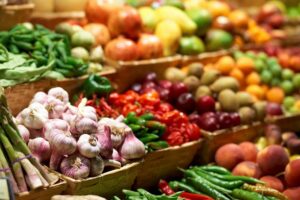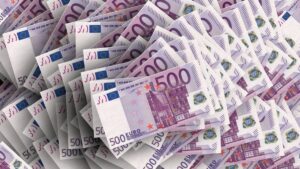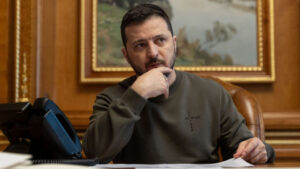
In 2023, Ukraine became the third largest supplier of agricultural products to the EU and increased its share of agricultural imports by 11% in January-September compared to 2022, the Polish publication farmer.pl reported, citing a report by the European Commission.
“Ukraine remains one of the three largest suppliers of agricultural products to the EU, according to the European Commission’s report on international trade. In the period from January to September this year, the European Union increased imports of agricultural products from Ukraine by 11% compared to 2022,” the publication wrote.
According to the report, the value of Ukrainian exports of agricultural products to the EU in the period from January to September 2023 reached EUR8.75 billion.
“Imports from Ukraine showed the largest increase in the period from January to September compared to 2022 (+891 million euros, or +11%), mainly due to an increase in grain imports,” the European Commission report says.
The biggest jump in these imports was recorded between January and June this year. Since June, imports have remained below the level of 2022, and in September they almost returned to the level of 2021, the EC said.
According to the results of the reporting period, Ukraine became the third largest exporter of agricultural products to the EU – after Brazil and the UK.
At the same time, Ukraine ranks 14th among the recipients of agricultural products from the European Union. From January to September of this year, Ukraine imported products from the EU for EUR 2.5 billion, which is 19% more than in the same period last year, farmer.pl noted.

The European Commission has announced the shipment of another 500 power generators to Ukraine.
“The ongoing brutal attacks by Russia have left Ukraine’s energy infrastructure fragile. We are sending 500 more power generators to Ukraine, bringing the total number to more than 5,500, to ensure adequate energy supply and keep vital services running,” the European Commission said in a statement on Twitter.
The financial value of the 500 power generators being sent to Ukraine is €16.5 million. The generators will be handed over to various Ukrainian ministries.
A post on the Commission’s website states that the goal is to ensure sufficient electricity supply during the cold and dark months, as well as to keep vital Ukrainian services, including hospitals, operational. 40 of the 500 generators are intended for schools.

Ukraine on Wednesday received EUR 150 million in non-repayable financial assistance from the EU as part of a bilateral agreement to finance the Support for Ukraine’s Early Recovery program (State Building and Resilience Contract), the Finance Ministry said.
“Grant funding will help ensure priority measures to restore critical facilities affected by Russia’s armed aggression, including transport infrastructure, utilities and services, social infrastructure and residential areas,” Minister Sergii Marchenko said in a release.
It is specified that the second tranche of EUR 100 million is expected in the first quarter of 2024. The funds will be used to finance both recovery activities and support small farms and other agricultural businesses.
The day before, Marchenko said that since the beginning of this year, Ukraine has managed to attract more than $39 billion in external financing, compared to $32.1 billion for the entire last year, and by the end of the year this amount will reach about $42.3 billion. In particular, the EU is expected to receive EUR 1.5 billion of the last tranche of macro-financial assistance this year.

In the coming days, Ukraine will officially initiate the process of assessing Ukrainian legislation for compliance with EU law, Ukrainian President Volodymyr Zelenskyy said in a video address on Sunday.
“We are preparing to work on a negotiation framework for Ukraine. We expect it in the spring. The negotiation process will not be easy, but the main thing is that historically we have determined that Ukraine will always be part of our common European home,” he said.
Zelensky thanked “everyone who helps to bring the necessary European decisions closer. To everyone who has joined, to politicians, civic leaders, and the people of different countries who equally believe in us, in Ukraine and in Europe.”

President of the European Council Charles Michel said that the European Council has decided to start negotiations on the accession of Ukraine and Moldova to the EU.
“The European Council has decided to start negotiations on the accession of Ukraine and Moldova. The European Council has granted candidate status to Georgia. And the EU will start negotiations with Bosnia and Herzegovina as soon as the necessary degree of compliance with the membership criteria is achieved, and invited the Commission to submit a report by March with a view to making such a decision,” he wrote on Twitter.

Federal Chancellor Karl Nehammer during a meeting with members of the National Council in the main committee on EU issues categorically opposed the “accelerated procedure” of Ukraine and Moldova’s accession to the European Union, the press service of the Austrian parliament reports.
“Nehammer told FPO MPs Petra Steger, Christian Hafeneker and Axel Kassegger that Austria would not agree to negotiate Ukraine’s accession under the current conditions. There should not be any preferential treatment for Ukraine, especially in relation to Bosnia and Herzegovina, which is also currently in accession negotiations,” the statement said.
He also noted that the President of the European Commission Ursula von der Leyen did not hold consultations before announcing the prospect of negotiations on Ukraine’s accession.
Separately, Nehammer noted that in order for the EU to be “suitable” for enlargement, internal reforms must be carried out.
“In general, Austria continues to follow the EU line when it comes to solidarity with Ukraine, but without violating its neutrality,” Nehammer explained. “It is primarily about financial assistance to support Ukraine as a ‘state as a whole,'” the statement said.